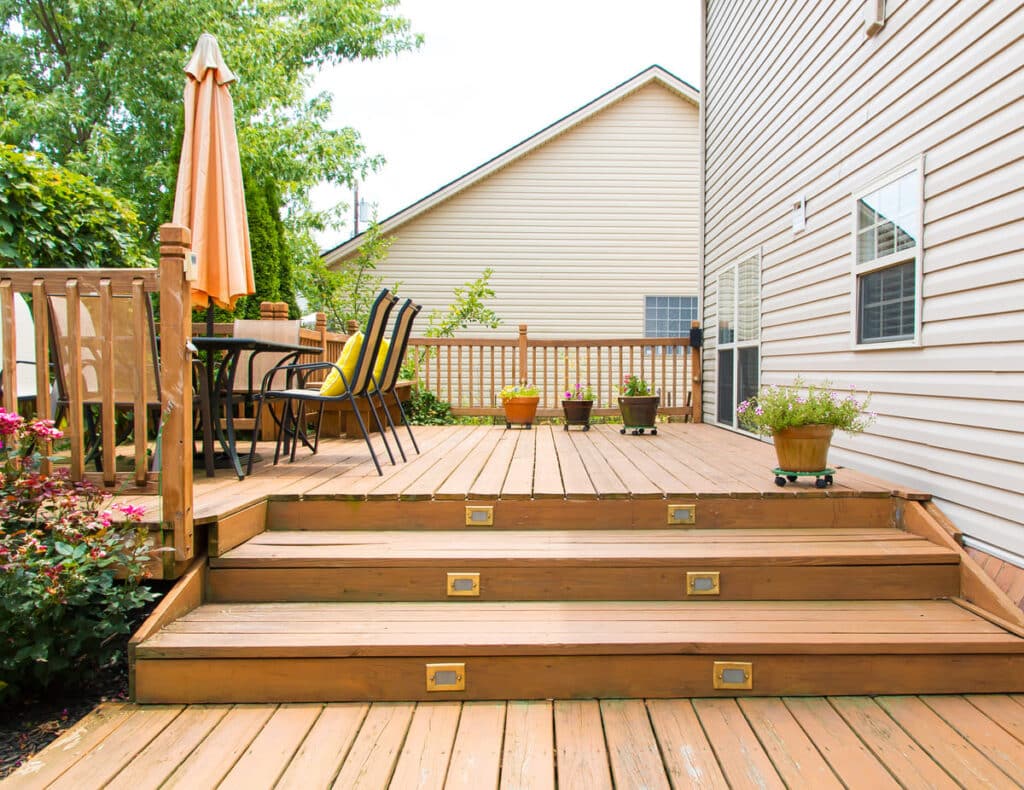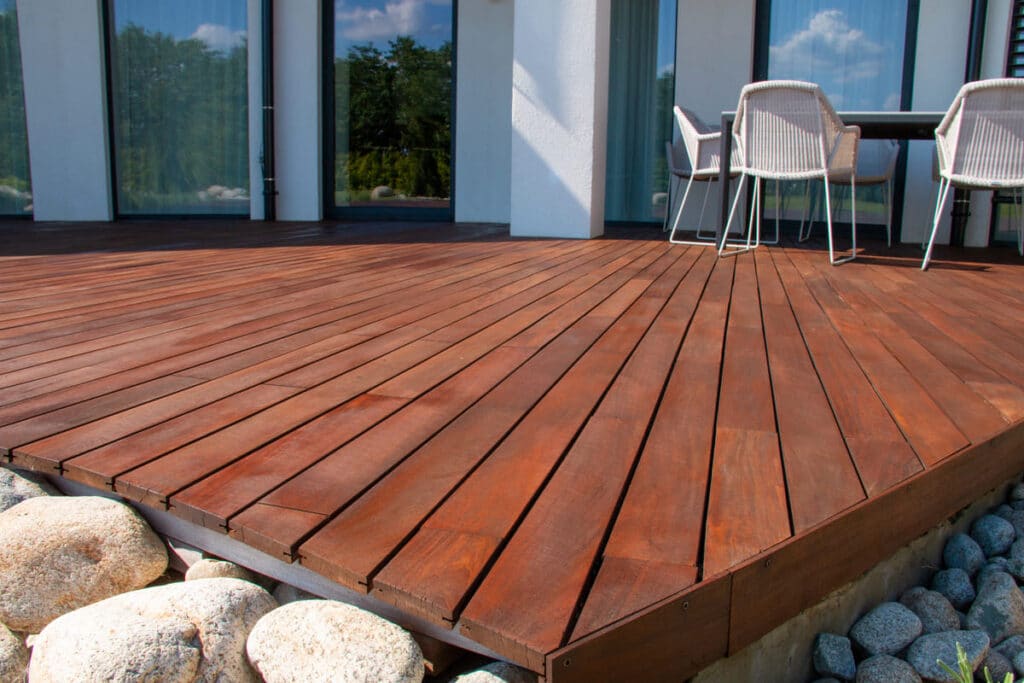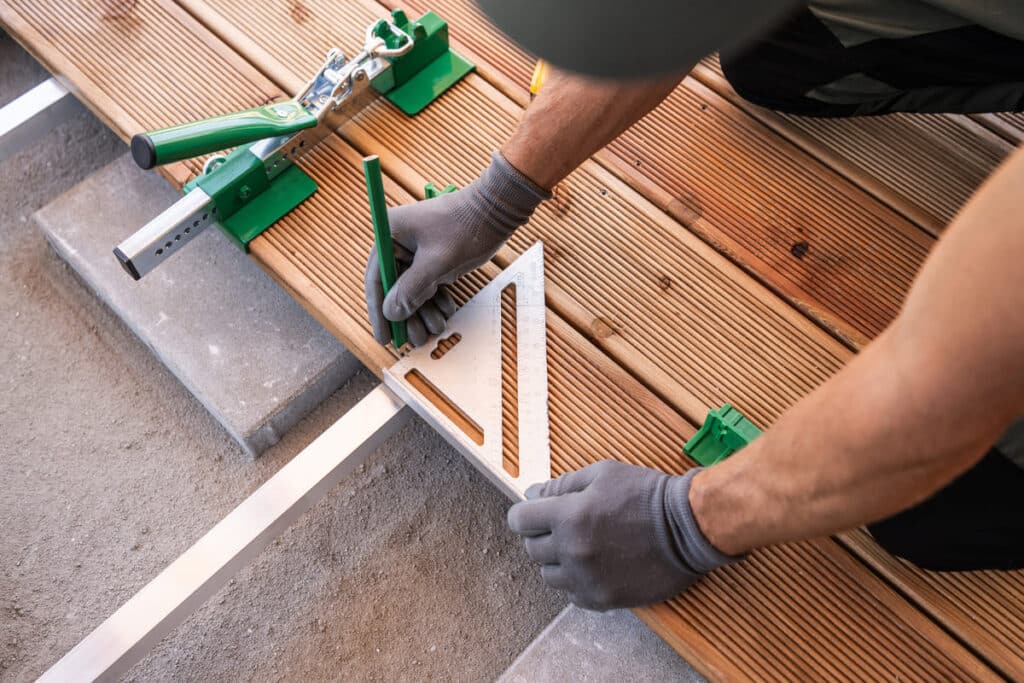Planning a new deck for your Massachusetts home? You’re making a smart investment. At Beantown Home Improvements, we understand that the material you pick can mean years of outdoor enjoyment or a constant headache of repairs. Let’s look at five of the best decking materials options that can really handle our climate.
Why Material Choice Matters in Massachusetts

Massachusetts sees dramatic seasonal changes. Winters can dip below 0°F while summer highs hover near 90°F. This change in temperature makes materials expand and shrink constantly. But temperature is not the only problem. Our region deals with high humidity that breeds mold and mildew. We get pounded by rain, snow, and ice throughout the year. Coastal homeowners face salt air that corrodes materials. Summer brings intense UV rays that fade and damage surfaces. Plus, the sun can really bake surfaces in the summer, and hurricane season brings unpredictable weather.
Composite Decking: The Low-Maintenance Option
Composite boards, which are made from wood fibers and recycled plastic, handle moisture and extreme temperatures well. Unlike traditional wood, composite won’t warp or split when temperatures drop. It resists rot even during our wettest seasons.
One concern about the composite was heat retention on hot days. Modern technology has solved this problem by offering solid PVC decking as a new option with cooling that can reduce surface temperatures by up to 35 degrees. Also, picking lighter colors is a good idea because they reflect sunlight better than dark ones.
Pros
Composite decking offers many benefits:
- No need to stain or seal
- It stands up well against rot, decay, and pests.
- Keeps out moisture to avoid warping
- Composite decks last 25 to 30 years; better brands can last 40 to 50 years.
- Made with recycled material
Cons
Before committing, it’s better to know its potential downsides:
- Higher initial investment at $10 to $14 per square foot
- Can scratch with heavy use
- Might fade a bit in direct sun over time
- Can get hot to walk on with darker colors
When considering composite vs wood decking for our climate, composite does not need the constant maintenance that wood demands.
PVC Decking: The Ultimate Weather Warrior
PVC uses 100 percent plastic polymers with zero organic materials. This makes it exceptionally tough against everything Massachusetts’s weather dishes out. The longevity is remarkable. A prime PVC decking can last around 50 years. When professionally installed, these products usually come with limited lifetime warranties covering defects like splitting, cracking, and fading.
Pros
There are reasons for its popularity:
- Virtually no maintenance required
- Resists mold, cracks, splintering, and warping
- Superior water resistance for all weather conditions
- Made from recycled materials
Cons
While durable, PVC does have a few characteristics to consider before investing:
- Most expensive upfront option
- Doesn’t replicate the real wood look or feel
- May produce squeaking sounds when walked on
- It needs professional installation due to the complex fastening systems.
- Can scratch somewhat easy
Tropical Hardwood: Built to Last

Tropical hardwoods like Ipe, Cumaru, Garapa, and Jatoba are great picks for harsh climates. These dense woods resist weather, rot, and insects naturally, without using chemicals. Consider Cumaru. It’s known for its resistance to decay and insects and has a Janka Hardness rating of 3,200 pounds of force. It naturally weathers to an attractive silver-gray patina over time. To keep the original color, use deck oil with UV protection or a sealer.
Pros
Homeowners who value natural strength and timeless beauty will appreciate what tropical hardwoods deliver:
- Naturally resistant to rot, insects, and moisture
- Beautiful grain patterns and rich colors
- It can last for 30 years, or even longer, even when exposed to the weather.
- High bending strength supports heavy items like hot tubs
- Can be sanded and repaired if damaged
Cons
Let’s look at some practical challenges that you’ll face:
- Higher cost than standard wood options
- You’ll need special saw blades and drill bits for installation.
- Heavier and more challenging to work with
- Limited availability compared to other materials
They are an excellent fit for New England weather, naturally battling the decay and insect issues that plague softer woods.
Pressure-Treated Wood: The Budget-Friendly Option
Pressure-treated lumber is wood that’s been treated with preservatives in a pressure chamber to help it resist rot, decay, and insects. It needs constant attention. You’ll need to clean and re-stain every couple of years. If you skip the maintenance, its lifespan drops drastically.
Pros
For those seeking a budget-friendly and familiar option, it remains a popular choice:
- Widely available and easy to install
- It has a natural wood look that you can stain or paint after allowed to dry for 6-8 months
- Strong yet lightweight
- Holds up well against rot and bugs if treated
- Can last 20 to 34 years with proper maintenance
Cons
Be ready to put in the work to keep it in good shape:
- Requires cleaning and re-staining every few years
- Shorter lifespan without diligent maintenance
- Prone to cracking, splintering, and warping over time
- Contains chemicals that impact the environment
- Higher long-term maintenance costs add up
In Massachusetts, expect it to last 10 to 34 years, depending on how well you maintain it. Wood decking requires consistent upkeep, including cleaning, re-sealing, and general maintenance, to reach its full potential lifespan.
Cedar: Natural Beauty with Weather Resistance
Western Red Cedar offers natural insect and rot resistance with beautiful looks. It’s naturally moisture-resistant and aromatic, which keeps bugs away in the summer.
However, cedar is a softwood. Without the high fiber density of tropical hardwoods, it’s more vulnerable to mold and mildew, especially in damp climates like ours. This means more upkeep compared to denser materials. Wood can experience rot, mold, and warping in harsh weather without regular sealing, staining, and inspections.
Pros
Cedar stands out for its visual warmth and environmentally friendly appeal:
- It naturally fights rot, decay, and insects.
- Attractive grain patterns and rich colors
- It is light and easy to handle
- Costs less than tropical hardwoods
- Naturally moisture-resistant and smells good
Cons
Despite its natural strengths, cedar has certain demands:
- Requires cleaning and staining every two years
- Softer than other woods, vulnerable to foot traffic damage
- Turns gray without maintenance
- Less durable than hardwoods or synthetic materials
- Higher maintenance needs in humid climates
Cedar typically lasts 15 to 25 years with proper maintenance, which means regular sealing, staining, and inspections to protect against our harsh weather.
Making the Right Choice for Your Massachusetts Home

Whether you lean toward composite, PVC, hardwood, or wood, the smartest first move is a free consultation with Beantown Home Improvements. We’ll check your place, exposure, structural needs, and budget to recommend the best decking solutions for your situation.
